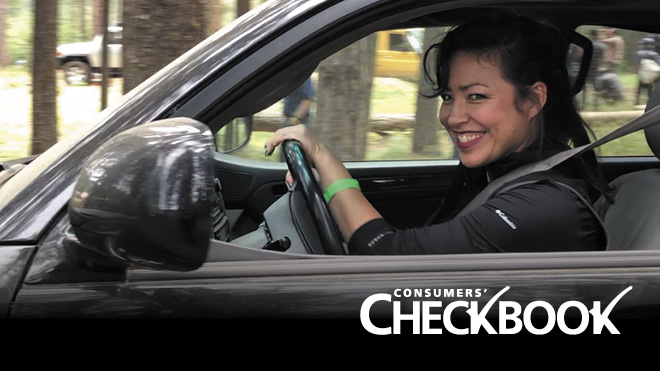
How To Finance a Car From a Private Seller
Learn about the process of financing a car from a private seller, from applying for a loan to getting the keys. We'll cover the documents you'll need, lender limitations and what you can expect throughout the process.
Takeaways: What To Know About Private-Party Auto Loans
- A private-party auto loan helps you finance a vehicle you're buying from an individual, not a dealership.
- The lender provides you with money to buy the car, which you repay over time with regular monthly installments.
- Private-party auto loans come with unique requirements and steps, but could save you money in the long run over financing through a dealership.
- Getting preapproved for a private-party auto loan before car shopping could help you stay on track with your purchase timeline.
You did your research to find exactly the kind of car you want to buy. Now, how do you pay for it when you're buying from a person, not a dealership?
"Most BECU members start with getting loan preapproval," said Lisa Dela Cruz-Kahoano, BECU consumer loans department manager. "Preapproval gives peace of mind and allows you to take time when shopping. You have 30 days to find the vehicle you want versus settling."
The process of buying a vehicle from a private seller differs from purchasing one from a dealership. Here are the ins and outs of financing a vehicle purchase with a private-party auto loan.
What Is a Private-Party Auto Loan?
A private-party auto loan is when you borrow money to purchase a car from an individual. You aren't buying from a dealership or car lot.
A private-party auto loan is similar to a traditional auto loan in many ways and different in others.
If you buy a car from a dealership or a used car dealer, you can get a loan while on the lot. The dealer can help handle the financing process. With a private-party auto loan, you'll need to set up financing through a lender. You will also be responsible for providing the necessary paperwork.
Many, but not all, banks and credit unions offer private-party auto loans. Just like all loan types, certain requirements must be met for the loan to be completed.
Example of a Private-Party Auto Loan Process
At BECU, private party auto loans are called "BECU title transfer," said Dela Cruz-Kahoano. BECU helps transfer the car's title to the new owner.
The buyer and seller make an appointment at a BECU location to ask questions, process and sign documents, and then BECU gives a check to the seller for the car's purchase.
Dela Cruz-Kahoano recommended making an appointment to save time and ensure all documents are in order and prepared for signing.
If the seller's financial institution still owns the car being sold, BECU sends payment to the lienholder (the bank or credit union, for example) to pay off the seller's existing auto loan.
For example, say you are shopping for a used 2022 Subaru Outback. You check prices on Facebook Marketplace and Craigslist. You also look up the vehicle in Kelley Blue Book, which lists the 2025 resale value of a 2022 Outback at $19,923.
Now that you know what type of vehicle you're looking for and the estimated purchase price, you can take that information to a financial institution to estimate your monthly payments. Using BECU's Auto Loan Calculator, you could estimate the cost with the following information, including the latest interest rates:
Vehicle condition: Used
Purchase price: $19,923
Down payment: $2,000
Loan term (months): 48
Interest rate: 6.49 as of Oct. 1, 2025
Estimated monthly payment: $425
Total loan amount: $17,923
Total interest paid: $2,475
Pros of a Private-Party Auto Loan
- Potentially borrowing less money: Private sellers often sell cars at lower prices than dealerships, which mark up prices to help cover marketing, physical space and other business expenses.
- Lower-cost loans: If you can get a loan through your bank or credit union, you may avoid some markups from getting a loan through an auto retailer.
- Available through credit unions: You may be able to compare terms and rates through banks, credit unions and online lenders.
Cons of a Private-Party Auto Loan
- Less available: In general, it can be more difficult to find a loan to buy a vehicle from a private seller, so you may have to look into community banks and other financial lenders.
- More paperwork: The lender may require paperwork from the buyer or seller to complete the lending process, including registration and title transfer.
- More restrictions: You may encounter more rules for a loan for a private party car sale, particularly compared with a new car from a dealership.
How To Finance a Private-Seller Car Purchase
You'll likely need an auto loan to buy from a private seller if you don't have enough cash.
This is typically a secured loan, using the car you're buying as collateral. Lenders may have limitations on your auto loan, such as mileage and age of the vehicle. These limits vary by lender.
In general, lenders won't finance:
- Lemon-law title or salvage title
- Commercial vehicles
- "Grey imports" that are manufactured for non-U.S. nations
- Cars older than the lender's specified limit
- Vehicles with more mileage than the lender's limit
Loan Terms
Your rate will vary based on:
- Car type (used, new, motorcycle, sports vehicle)
- Model year
- Trim
- Credit score
- Loan amount requested
- Down payment amount
Lenders might look at the same data, but differ in what they offer, resulting in varying interest rates and loan terms.
At BECU, for example, vehicle loan APRs as of Oct. 1, 2025, ranged from:*
- New auto (2023 and newer): 5.99% - 18%; estimated monthly payment would be $386.61per month based on a five-year, $20,000 loan at 5.99% APR.
- Used auto (2010 - 2022) 6.49% - 18%; estimated monthly payment would be $391.28. per month based on a five-year, $20,000 loan at 6.49% APR.
At BECU, loan terms are available for up to 84 months. The lowest auto loan rates advertised are based on a loan term of 60 months or less and a loan-to-value ratio of 90% or less. The vehicle's mileage can't exceed 150,000 and its age can't exceed 15 years. Loan-to-value is based on the Kelley Blue Book wholesale value.
Lender Requirements
Review and compare a few lenders you're considering to learn more about their minimum requirements for the borrower and the vehicle being purchased. You may need to meet requirements for income, employment history and credit score.
You'll likely need to do a bit of extra paperwork to buy a car from a private seller instead of buying from a dealership. For example, depending on the state you're in, a lender might require you to provide documentation from the Department of Licensing and an emissions check certificate. (The state of Washington no longer requires emissions testing). Or the lender may ask to see the car's current registration.
At BECU, for example, requirements include:
- A copy of current, non-expired car registration.
- Borrower- and seller-signed bill of sale for the vehicle.
- Any current lienholder information, including the lienholder's name, payoff address, phone number, daily per diem and account number.
- If the car is "free and clear" or doesn't have a lien at all, provide a free and clear title.
Using a Personal Loan Instead
Sometimes, you can't get a traditional auto loan for certain cars — such as cars older than 25 years ("classic" cars) or imported cars. So, another option is an unsecured personal loan. A personal loan doesn't use the car or anything else as collateral. As a result, your loan will likely have a higher interest rate.
In addition, if your bank or credit union doesn't offer a private-party auto loan at all and you don't want to shop around, you could apply for a personal loan.
Preparing To Finance a Private Seller Purchase
Determine Your Budget and Credit Status
Check your credit history for free at AnnualCreditReport.com to see your potential eligibility for a private-party loan.
Determine how much you can afford to spend on a car, including financing costs.
Research Lenders
Research and compare private seller loans from different lenders, including banks, credit unions and online lenders. Contact the lender by phone to determine the required documents and confirm their specific requirements for a loan to buy a vehicle from a private party, including any minimum FICO score.
Research the Process in Your State
Check with your state's vehicle licensing department to determine the process of registering your vehicle, including the lender's lien on your vehicle title. To register your car, the licensing department may require the seller to sign over the title to you, along with a bill of sale documenting the transaction and a copy of your lender's promissory note.
Get Preapproved or Prequalified for a Private Party Loan
A preapproval or prequalification lets you know how much money you can borrow for how long and at what interest rate.
When you get preapproved, a lender makes a credit inquiry. At some financial institutions, this inquiry is a "soft pull" that doesn't affect your credit score. At BECU, preapprovals require a hard pull. Always ask how the preapproval or prequalification process works and how it affects your credit.
Research and Find the Right Car
Research different models and find the right car for your needs and budget. Check the car's history, including any accidents and previous use. Ask your insurance company to estimate the coverage cost if you add the vehicle to your policy.
Review the Seller's Documentation
Buying from a private seller exposes you to scams, whether rolled-back odometers or accidentally buying an unregistered, wrecked or rebuilt car. You must ensure the seller can provide you with the following:
- Title: Ensure the seller has the title and it's free of any liens (other "holds" on the title from financial institutions such as lenders for a debt).
- Registration: Check that the registration of the used car is up to date.
- CARFAX: Either you or the seller should pay for this critical report, which reviews the auto's history on the road, including service details and accident information.
Applying for a Private Party Auto Loan
According to U.S. News & World Report, the right time to apply for a private party auto loan is a few weeks before you plan to purchase a vehicle. That way you'll have an appropriate amount of time to review your car loan options, get preapproved for the loan, and stay on track to purchase the vehicle.
1. Gather Your Documents
Documents that may be required include:
- Valid, non-expired, state-issued driver's license.
- Up to two years' proof of income via tax returns.
- Vehicle information, including VIN, make, model, year and mileage.
- A copy of the title, both front and back.
2. Apply For the Loan
Fill out an application with the lender or multiple lenders providing the required documents. This loan application stage requires you to authorize a full credit report inquiry. This inquiry (in contrast to the prequalification) is a "hard pull" and will likely affect your credit score.
Don't be afraid to shop around. If several auto loan credit inquiries occur within 14 and 45 days, they're considered one credit inquiry and only impact your credit as one inquiry.
On the application, you'll provide information about:
- Your identity (Social Security number, birthdate).
- Residence and how long you've lived there.
- Employer's name and contact information and your hire date.
- All income you want to be considered to help you qualify you for the loan.
- Driver's license information.
- References.
3. Wait for Final Approval
At BECU, a loan processor reaches out within 24-48 business hours after receiving your documentation. If your loan is approved, a loan processor schedules your signing appointment.
4. Close On Your Loan
If your loan is approved, you'll receive the loan terms. Review the loan terms and conditions before signing the promissory note. Depending on the financial institution, you may need to attend in person or use DocuSign for the process. Although you may be able to get same-day auto loan approval from some lenders, it could take a few days to receive your funds.
5. Contact the Seller To Finalize the Sale
You'll contact the seller and finalize the sale. In general, this will involve:
- Payment in cash, cashier's check, via a payment app, or a check directly from the credit union to the seller.
- Vehicle registration.
- Notarized vehicle title application, where you'll add the lender as the lienholder.
- Bill of sale.
- Affidavit of Loss/Release of Interest form completed by the car's seller.
You may have a limited timeframe to complete some paperwork. In Washington, as the buyer, you have just 15 days to visit a vehicle licensing office with the certificate of title, bill of sale and payment for fees and taxes.
In some states, you'll also pay a sales tax for purchasing a car from an individual when you license or register and title your vehicle. In other situations, you might pay the tax to the lender offering you a private party loan.
6. Get the Keys to Your New Car
Congratulations, you've just navigated the process of getting an auto loan to buy a privately sold car.
FAQs about Private Party Auto Loans
What is a Private-Party Auto Loan?
A private party auto loan helps a car buyer purchase a vehicle from an individual versus a dealership. You can often find auto loans through credit unions to buy a vehicle from a private party.
How Do I Qualify for an Auto Loan To Buy a Vehicle From a Private Party?
To qualify for an auto loan from a credit union to buy a vehicle from a private party, you must be at least 18 and a credit union member. You should be familiar with the minimum credit score and income requirements and be able to meet those requirements and provide documentation. Also, be aware of the lender's limitations on the types of vehicles they are willing to finance. Limits might include the number of miles or age of the vehicle.
How Can I Avoid Getting Scammed?
With the vehicle identification number, use CARFAX to review the car's history and use the National Highway Traffic Safety Administration site to ensure it hasn't been recalled. Get the vehicle inspected as well. But remember that you don't benefit from state and federal consumer protections regarding dealerships. Don't say yes to a seller pressuring you to send money by wire or pay a deposit before your private party auto loan is approved.
The above article is intended to provide generalized financial information designed to educate a broad segment of the public; it does not give personalized financial, tax, investment, legal, or other business and professional advice. Before taking any action, you should always seek the assistance of a professional who knows your particular situation when making financial, legal, tax, investment, or any other business and professional decisions that affect you and/or your business.
* Financing is subject to BECU membership, credit approval, and other underwriting criteria; not every applicant will qualify. Rates are based on an evaluation of credit history and other factors specific to your loan (such as loan term, age of collateral, loan-to-value, loan amount) and may be higher than the lowest rates advertised. Your final APR may differ from your loan interest rate due to additional fees that may apply. Advertised APR in effect as of 10/01/2025. Loan program offered including rates, terms, and conditions are subject to change without notice.



